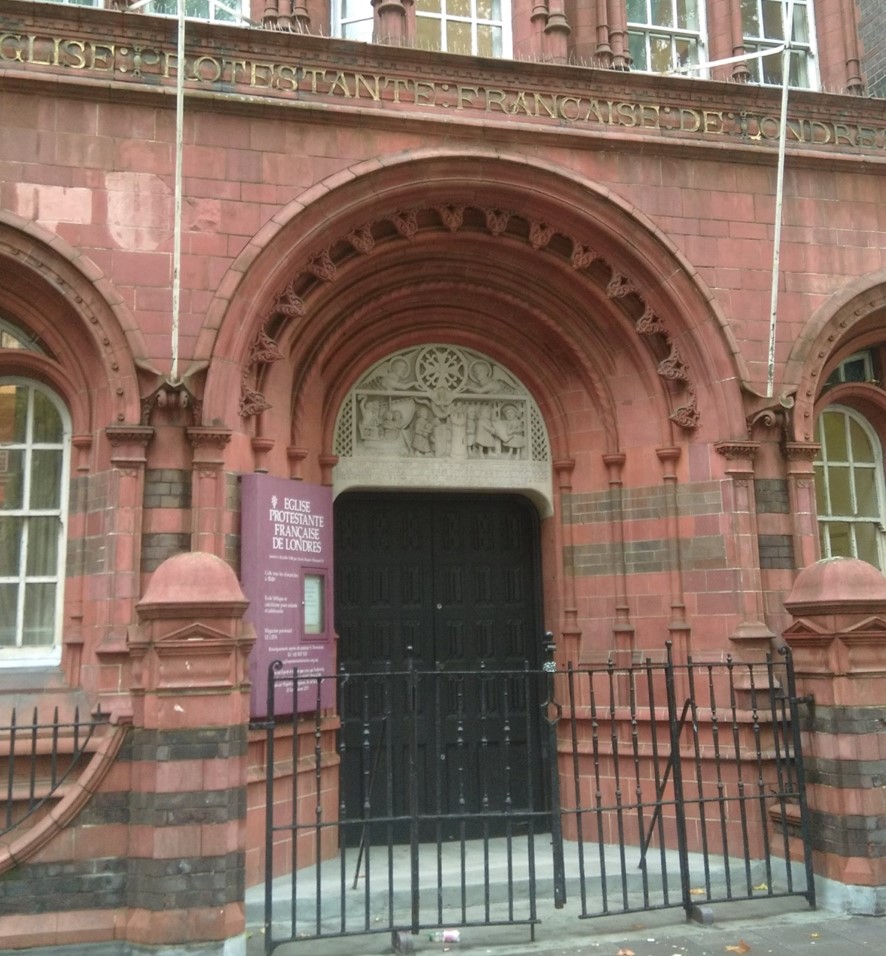Each month, a researcher shares their experiences of using a particular archive. The overall aim of this section is to create a database of the different archives available to those working on French and Francophone studies that will be of help particularly to students just starting out in research.
Annalisa Nicholson is a PhD student in the French department at the University of Cambridge. Here she talks about her research at the archive of the French Protestant Church, London.
The Église Protestante Française de Londres, or the French Protestant Church London, was constructed at the end of the nineteenth century by Aston Webb with its first service on 25th March 1893. But its story begins in the sixteenth century when waves of Huguenot migrants and refugees arrived in London to escape the ravages of the Wars of Religion that were engulfing France. The increasing persecution of Huguenots during the reign of Louis XIV (r.1643-1715) culminated in the Revocation of the Edict of Nantes in 1685, prompting an enormous exodus of Huguenots from France of which 40, 000-50, 000 settled in London. Two distinct Huguenot communities emerged: one near Spitalfields whose church was situated on Threadneedle Street, and the other around Soho, and it is the community in Soho that would eventually form the congregation of the French Protestant Church London.

Stemming from this history, the collection of the French Protestant Church London comprises over 300 volumes of archival material spanning the sixteenth, seventeenth, and eighteenth centuries. This material also contains documents relating to the church of Threadneedle Street and its incorporated churches, widening the significance of the collection to cover Huguenot history from both the west and east of London.
The collection includes account books, lists of members, lists of fines, Livre des Témoignages, and records of poor relief, all of which enable researchers of Huguenots in Britain to trace the size and impact of Huguenot communities, and gain insight into the migration and assimilation of Huguenots from a wide range of social backgrounds. While there is no digital list of this archive collection online, there is a print catalogue, which is available in most major libraries and can be consulted at the archive itself:
R. Smith, The Archives of the Protestant Church of London: A Handlist, Huguenot Society of London Quarto Series (1972) Vol. 50.
The archive also boasts a large collection of printed books, predominantly translations of religious texts as well as religious commentaries by prominent reformers such as Jean Calvin.
My research brought me to this archive and library in search of material on the group of Huguenots who had attended the Mazarin salon in late seventeenth-century London. The Mazarin salon was London’s first major salon set up by French exiles Hortense Mancini, Duchesse de Mazarin, and Charles de Saint-Évremond. In particular, the salon attracted the Huguenot former diplomats Henri de Ruvigny and Armand de Bourbon, the novelist Anne de La Roche-Guilhen, and women of the French court, such as Charlotte Bourbon-Malauze. However, given that the archival documents kept at the French Protestant Church London tend to be long lists of names and signatures, the archive is less suited to research on individual figures (unless you are looking for a specific signature or need to verify an individual’s affiliation to a church), and better for understanding the broader scope and impact of the Huguenot diaspora as a whole.
The archive and library are staffed solely by volunteers, which means that consultations need to be arranged in advance via email and usually are offered on Tuesdays and Wednesdays. They ask that consultations are arranged at least two weeks in advance.
The location of the archive in the heart of Soho makes it ideally situated for a research trip. It is close to numerous tube stations including Tottenham Court Road and Leicester Square, and is easily accessible by bus. As for lunch, I would whole-heartedly recommend Govinda’s Restaurant, a stone’s throw away from Soho Square. Run by members of the Radha Krishna Temple, it offers a large choice of vegetarian and vegan options at affordable prices. There are also several supermarkets nearby for a summer picnic in the Square.
Annalisa Nicholson is a PhD student in the French department at the University of Cambridge. Funded by the AHRC, her thesis examines Hortense Mancini and her salon in Restoration London. Her research interests include early modern women, exile, and Anglo-French networks.
Thank you very much for this, Annalisa!
William Rispin, who manages this page, has recently had his book, The French Centre Right and the Challenges of a Party System in Transition, published by Palgrave Macmillan. He has started a blog on current developments in French Politics as we approach the 2022 presidential elections. It can be found here: https://williamrispinsfrenchpoliticsblog.blogspot.com/


